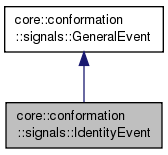 |
Rosetta
3.8
|
All Classes Namespaces Files Functions Variables Typedefs Enumerations Enumerator Friends Macros Pages
 |
Rosetta
3.8
|
signals a change in residue identity in a Conformation More...
#include <IdentityEvent.hh>

Public Types | |
| enum | Tag { EMPTY, INVALIDATE, RESIDUE } |
| the type of length change More... | |
| typedef core::Size | Size |
| typedef GeneralEvent | Super |
 Public Types inherited from core::conformation::signals::GeneralEvent Public Types inherited from core::conformation::signals::GeneralEvent | |
| typedef core::conformation::Conformation | Conformation |
Public Member Functions | |
| IdentityEvent () | |
| default constructor More... | |
| IdentityEvent (Conformation const *conf, Tag const t, Size const &pos, Residue const *res) | |
| constructor More... | |
| IdentityEvent (IdentityEvent const &rval) | |
| copy constructor More... | |
| virtual | ~IdentityEvent () |
| default destructor More... | |
| IdentityEvent & | operator= (IdentityEvent const &rval) |
| copy assignment More... | |
 Public Member Functions inherited from core::conformation::signals::GeneralEvent Public Member Functions inherited from core::conformation::signals::GeneralEvent | |
| GeneralEvent () | |
| default constructor More... | |
| GeneralEvent (Conformation const *conf) | |
| constructor More... | |
| GeneralEvent (GeneralEvent const &rval) | |
| copy constructor More... | |
| virtual | ~GeneralEvent () |
| default destructor More... | |
| GeneralEvent & | operator= (GeneralEvent const &rval) |
| copy assignment More... | |
Public Attributes | |
| Tag | tag |
| tag indicating type of identity change More... | |
| Size | position |
| residue position More... | |
| Residue const * | residue |
| direct access to residue More... | |
 Public Attributes inherited from core::conformation::signals::GeneralEvent Public Attributes inherited from core::conformation::signals::GeneralEvent | |
| Conformation const * | conformation |
| the Conformation firing the signal More... | |
signals a change in residue identity in a Conformation
|
inline |
default constructor
|
inline |
constructor
| pos | residue position |
|
inline |
copy constructor
|
inlinevirtual |
default destructor
|
inline |
copy assignment
References core::conformation::signals::GeneralEvent::operator=(), position, residue, and tag.
| Size core::conformation::signals::IdentityEvent::position |
residue position
Referenced by core::pose::PDBInfo::on_identity_change(), and operator=().
| Residue const* core::conformation::signals::IdentityEvent::residue |
direct access to residue
Referenced by core::pose::PDBInfo::on_identity_change(), and operator=().
| Tag core::conformation::signals::IdentityEvent::tag |
tag indicating type of identity change
Referenced by core::pose::PDBInfo::on_identity_change(), and operator=().
 1.8.7
1.8.7